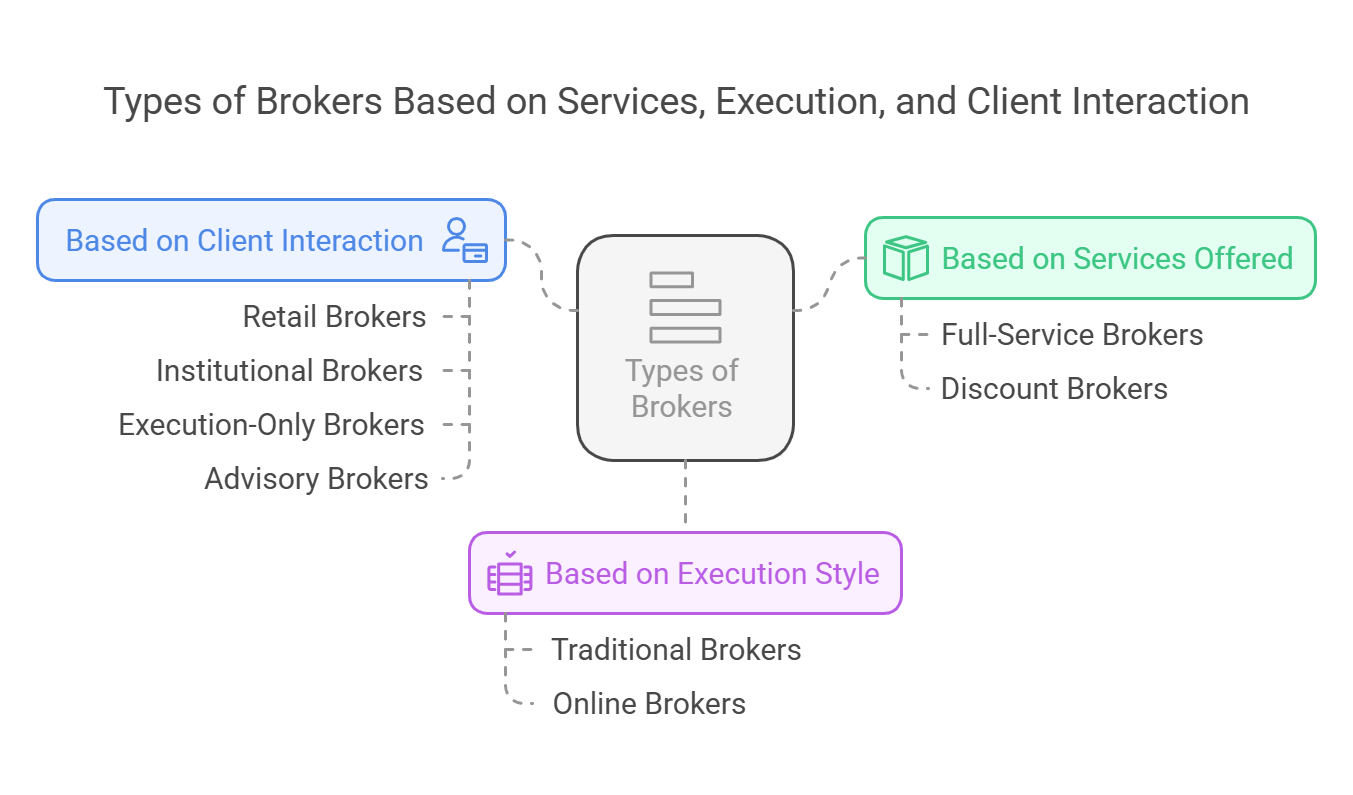Types of Brokers in the Stock Market
Introduction
Stockbrokers serve as essential intermediaries between investors and stock exchanges. They facilitate the buying and selling of securities, offering a range of services that can include research, investment advice, and portfolio management. The choice of a broker is a crucial decision for investors, depending on their individual needs, trading style, and risk tolerance.
1. Types of Brokers Based on Services Offered
A. Full-Service Brokers:
- Definition: Full-service brokers provide a comprehensive suite of financial services, catering to a wide range of investor needs.
-
Services Offered:
- Investment Advisory: Offer personalized investment recommendations based on the client's financial goals, risk profile, and investment horizon.
- Research Reports: Provide in-depth analysis of companies, industries, and the overall market, helping investors make informed decisions.
- Portfolio Management: Manage investment portfolios on behalf of clients, implementing investment strategies and monitoring performance.
- Trading Across Asset Classes: Facilitate trading in various asset classes, including equities, derivatives, commodities, mutual funds, and fixed income securities.
- Target Audience: Suitable for long-term investors, high-net-worth individuals (HNIs), and those who require personalized investment advice and comprehensive support.
- Brokerage Fees: Typically charge higher brokerage fees compared to discount brokers, reflecting the value of the premium services they offer.
- Examples: HDFC Securities, ICICI Direct, Kotak Securities, Motilal Oswal.
B. Discount Brokers:
- Definition: Discount brokers focus on providing low-cost trading services, primarily offering execution-only services.
-
Services Offered:
- Execution Services: Enable investors to buy and sell securities quickly and efficiently through online trading platforms.
- Limited Services: Generally do not offer research reports, investment advisory, or portfolio management services.
- Target Audience: Suitable for frequent traders, experienced investors, and those who are comfortable making their own investment decisions without external guidance.
- Brokerage Fees: Charge lower brokerage fees compared to full-service brokers, often using a flat-fee per trade or a fixed monthly fee model.
- Examples: Zerodha, Groww, Upstox, Angel One, 5Paisa.
2. Types of Brokers Based on Execution Style
A. Traditional Brokers (Offline Brokers):
- Definition: Traditional brokers require clients to place orders physically (in person) or over the phone.
- Trading Methods: Reliance on physical branch networks and personal interactions.
- Suitable For: Investors who prefer personal assistance from a broker and are comfortable with a more hands-on, relationship-based approach.
- Brokerage Fees: Typically charge higher brokerage fees compared to online brokers due to the personalized service they provide.
B. Online Brokers:
- Definition: Online brokers provide electronic trading platforms, including web-based and mobile applications, allowing investors to place orders and manage their accounts remotely.
- Trading Methods: Orders are placed and executed digitally, without manual intervention, enabling faster and more efficient trading.
- Suitable For: Tech-savvy investors who are comfortable using online platforms and managing their investments independently.
- Brokerage Costs: Offer lower brokerage costs compared to traditional brokers, making them an attractive option for cost-conscious investors.
- Examples: Zerodha, Upstox, 5Paisa, Angel One.
3. Types of Brokers Based on Client Interaction
A. Retail Brokers:
- Definition: Serve individual investors, providing trading facilities and investment services tailored to their needs.
- Client Base: Focus on small and medium-sized investors, helping them navigate the stock market and achieve their financial goals.
B. Institutional Brokers:
- Definition: Handle large transactions for institutional clients, such as corporations, mutual funds, insurance companies, and banks.
- Trading Methods: Execute bulk trades, often through block deals (large-volume trades executed privately) and negotiated transactions.
C. Execution-Only Brokers:
- Definition: Simply execute trades on behalf of clients, without offering any investment advice or research services.
- Service Scope: Primarily focus on providing efficient and reliable order execution, catering to experienced traders who have their own investment strategies.
D. Advisory Brokers:
- Definition: Provide investment recommendations and research analysis to their clients, helping them make informed investment decisions.
- Service Scope: Combine order execution with advisory services, charging higher brokerage fees to compensate for the additional expertise and guidance they provide.
Comparison of Different Types of Brokers
| Broker Type | Services Provided | Brokerage Fees | Best For |
|---|---|---|---|
| Full-Service Broker | Trading, research, advisory, portfolio management | High | Long-term investors, HNIs, investors needing comprehensive support |
| Discount Broker | Only trading execution | Low | Frequent traders, experienced investors |
| Online Broker | Electronic trading | Low | Tech-savvy investors, independent traders |
| Traditional Broker | Offline trading & personal assistance | High | Conservative investors, those preferring in-person assistance |
| Institutional Broker | Large volume trading, specialized services for institutions | Medium to High | Mutual funds, FIIs, banks, other large institutional investors |
| Execution-Only Broker | Order execution without advisory or research | Low | Sophisticated investors with their own strategies |
| Advisory Broker | Order execution combined with investment recommendations and research analysis | Medium to High | Investors seeking guidance and expert insights |
Conclusion
The choice of broker depends on an investor's individual trading style, service requirements, and cost preferences. Full-service brokers are ideal for investors who need research, advisory, and portfolio management services, while discount brokers are more suitable for cost-conscious traders who are comfortable making their own investment decisions. Online brokers provide a convenient and affordable option for tech-savvy investors, while traditional brokers cater to those who prefer personal assistance. Understanding these distinctions is essential for investors to select the right broker to meet their specific needs and investment objectives.


No Comments